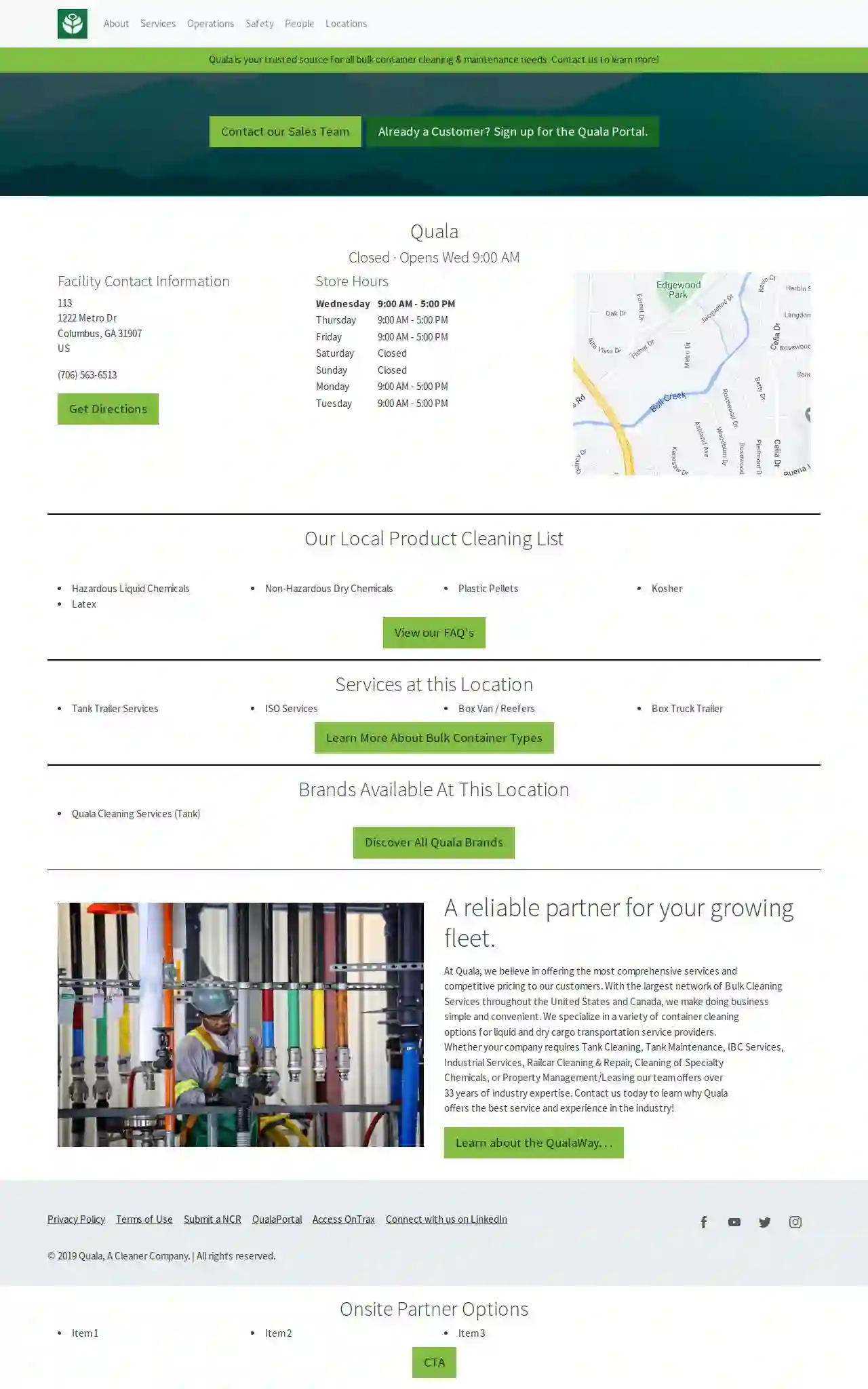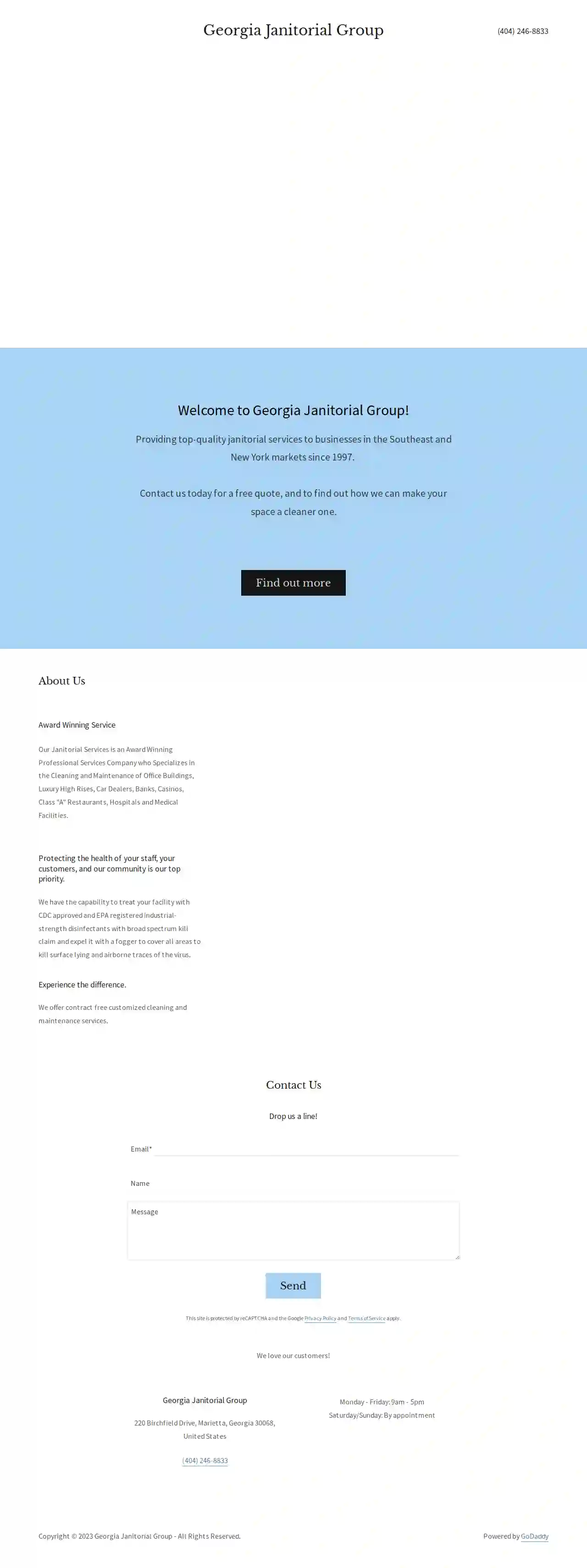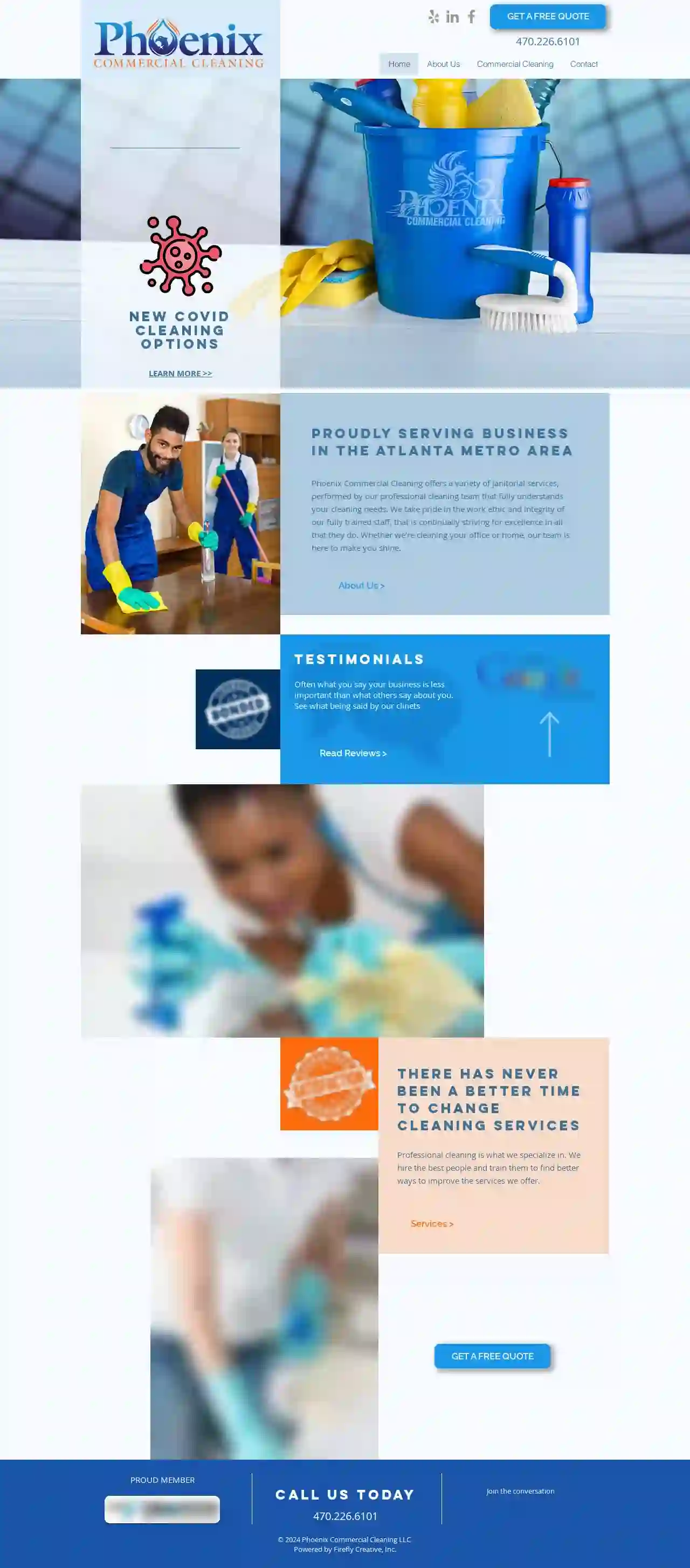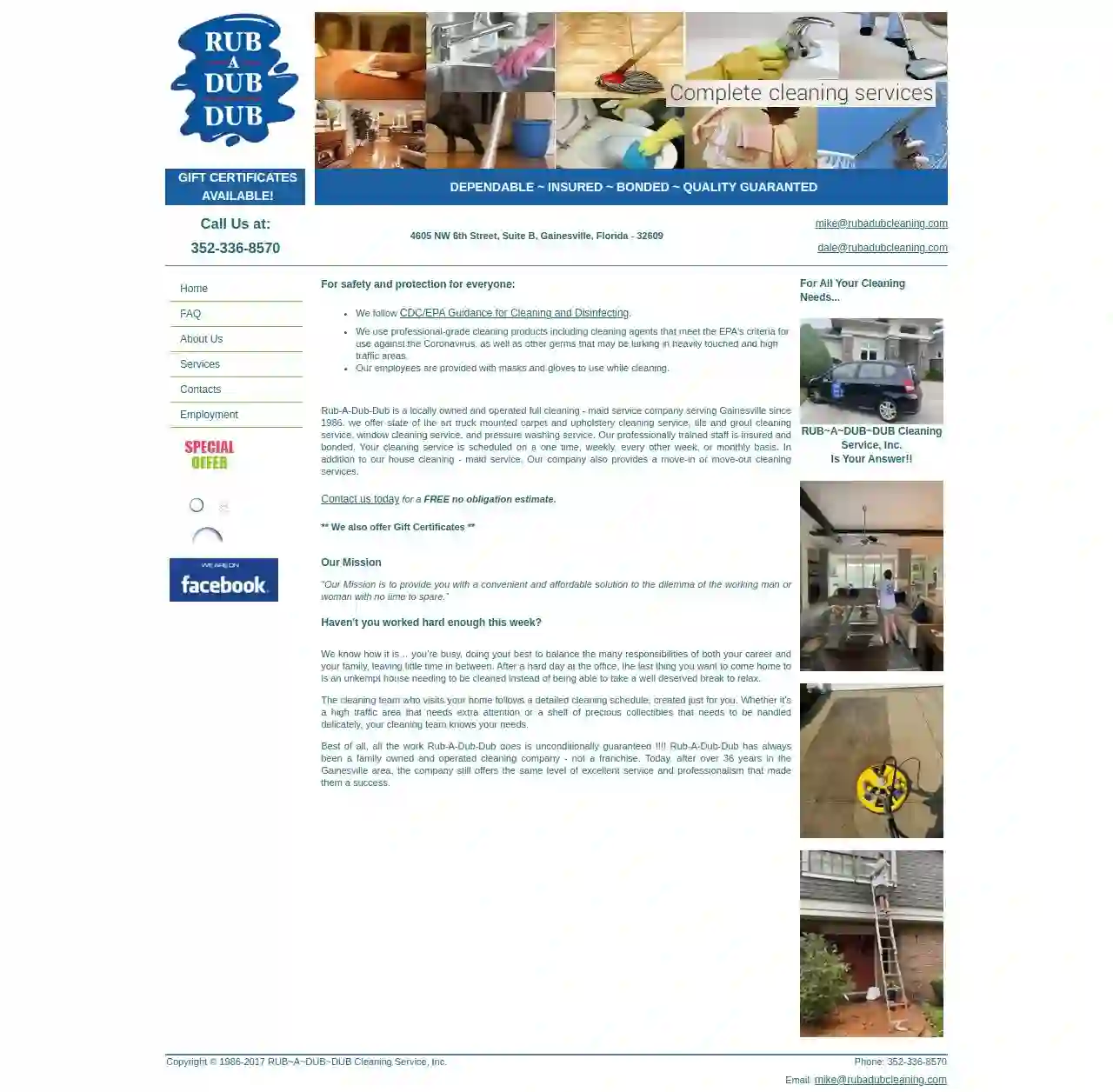Cleaning Services Duluth
Find the best Residential Cleaning in Duluth
Get multiple Local Cleaners quotes for your project today! Compare profiles, reviews, accreditations, portfolio, etc... and choose the best deal.
Service Needed
City or Town
- Ev
EverClean Solutions
4.47 reviewsAtlanta, US- Services
- Why Us?
Get Quote 
Quala
4.540 reviewsAtlanta, US- Services
- Why Us?
Get Quote
Georgia Janitorial Group
51 reviewsAtlanta, US- Services
- Why Us?
Get Quote
Phoenix Commercial Cleaning, LLC
57 reviewsAtlanta, US- Services
- Why Us?
Get Quote
Georgia Pro Cleaners, LLC
51 reviewsAtlanta, US- Services
- Why Us?
Get Quote
Natural Shine Home Cleaning
515 reviewsGainesville, US- Services
- Why Us?
Get Quote
Ward Melville Paver Cleaning & Sealing Pros
56 reviewsAtlanta, US- Services
- Why Us?
Get Quote
Eliteness Cleaning Maid Service
3.935 reviewsAtlanta, US- Services
- Why Us?
Get Quote
CSM America
3.345 reviewsAtlanta, US- Services
- Why Us?
Get Quote
Rub-A-Dub-Dub Cleaning Services
4.636 reviewsGainesville, US- Services
- Why Us?
Get Quote
Over 60,241+ Janitorial Contractors in our network
Our cleaning companies operate in Duluth & surrounding areas!
CleaningMatch has curated and vetted the Best Janitorial Services arround Duluth. Find the most trustworthy business today.
Frequently Asked Questions About Cleaning Services
Find answers to common questions about cleaning services and hiring cleaning companies in the USA.
- Declutter first: Before cleaning, declutter surfaces and remove any items that don't belong. This makes cleaning easier and prevents distractions.
- Gather your supplies: Assemble all your cleaning supplies, including cleaners, cloths, sponges, and a trash bag, in a caddy or bucket to avoid wasting time searching for them.
- Work from top to bottom: Start cleaning from the top of each room and work your way down to prevent dust and debris from falling on already cleaned surfaces.
- Focus on high-traffic areas: Pay extra attention to high-traffic areas like kitchens and bathrooms, where dirt and germs accumulate quickly.
- Use the right tools: Utilize appropriate cleaning tools for different surfaces and tasks. Microfiber cloths are effective for dusting and cleaning glass, while scrub brushes are ideal for tough stains.
- Clean in sections: Break down larger tasks into smaller sections to avoid feeling overwhelmed. Focus on one area at a time before moving on to the next.
- Establish a routine: Create a regular cleaning schedule and stick to it. This prevents dirt buildup and makes cleaning more manageable.
- Floors: Use floor cleaners designed for your specific floor type, such as hardwood, tile, or laminate. Avoid using harsh cleaners that can strip finishes or cause discoloration.
- Countertops: Clean granite, marble, or quartz countertops with pH-neutral cleaners to prevent etching or damage. Use disinfecting wipes or sprays for other countertops.
- Bathrooms: Use bathroom cleaners designed to remove soap scum, mildew, and hard water stains. Avoid using abrasive cleaners on fixtures or tiles.
- Glass and Mirrors: Clean windows and mirrors with glass cleaners that leave a streak-free finish. Avoid using paper towels, which can leave lint behind.
- Appliances: Clean stainless steel appliances with specialized cleaners that prevent streaks and fingerprints. Use degreasers for ovens and stovetops.
- Regular dusting: Dust frequently using microfiber cloths or a duster. Pay attention to surfaces that attract dust, such as shelves, electronics, and furniture.
- Vacuuming: Vacuum carpets and rugs regularly using a vacuum cleaner with a HEPA filter to trap dust mites and allergens.
- Air Purifier: Consider using an air purifier to remove dust particles and allergens from the air.
- Reduce Clutter: Clutter provides more surfaces for dust to settle. Declutter regularly to minimize dust traps.
- Window Treatments: Wash or vacuum window treatments, such as curtains or blinds, regularly to remove dust buildup.
- Bedding: Wash bedding, including sheets, pillowcases, and blankets, weekly in hot water to remove dust mites.
- Doormats: Place doormats at entrances to trap dirt and dust from shoes before they enter your home.
- Regular Sweeping or Dust Mopping: Sweep or dust mop hardwood floors daily to remove dust, dirt, and debris.
- Vacuuming: Vacuum hardwood floors weekly using a vacuum cleaner with a hardwood floor attachment to avoid scratches.
- Damp Mopping: Damp mop hardwood floors with a hardwood floor cleaner as needed. Avoid excessive water, as it can damage the wood.
- Prevent Scratches: Place felt pads under furniture legs to prevent scratches. Avoid dragging heavy objects across the floor.
- Avoid Harsh Cleaners: Do not use harsh chemicals, abrasive cleaners, or furniture polish on hardwood floors.
- Professional Cleaning: Consider hiring a professional hardwood floor cleaning service for deep cleaning and refinishing as needed.
What are some tips for cleaning my own home efficiently?
Cleaning your home efficiently can save time and effort. Follow these tips to streamline your cleaning routine:
By implementing these strategies, you can clean your home more efficiently and maintain a cleaner and healthier living space.
By implementing these strategies, you can clean your home more efficiently and maintain a cleaner and healthier living space.
How do I choose the right cleaning products for different surfaces?
Different surfaces require specific cleaning products to avoid damage and achieve optimal results. Here's a guide:
If you're unsure about the right cleaning product for a surface, consult the manufacturer's instructions or seek advice from a cleaning professional.
If you're unsure about the right cleaning product for a surface, consult the manufacturer's instructions or seek advice from a cleaning professional.
How do I prevent dust from accumulating in my home?
Dust is a common household nuisance, but several preventive measures can minimize its accumulation:
By implementing these preventive measures, you can significantly reduce dust accumulation and maintain a cleaner and healthier home.
By implementing these preventive measures, you can significantly reduce dust accumulation and maintain a cleaner and healthier home.
What are some tips for cleaning hardwood floors?
Hardwood floors add elegance and warmth to a home, but they require proper care to maintain their beauty. Here are some tips:
By following these tips, you can keep your hardwood floors looking beautiful for years to come.
By following these tips, you can keep your hardwood floors looking beautiful for years to come.
What are some tips for cleaning my own home efficiently?
Cleaning your home efficiently can save time and effort. Follow these tips to streamline your cleaning routine:
By implementing these strategies, you can clean your home more efficiently and maintain a cleaner and healthier living space.
- Declutter first: Before cleaning, declutter surfaces and remove any items that don't belong. This makes cleaning easier and prevents distractions.
- Gather your supplies: Assemble all your cleaning supplies, including cleaners, cloths, sponges, and a trash bag, in a caddy or bucket to avoid wasting time searching for them.
- Work from top to bottom: Start cleaning from the top of each room and work your way down to prevent dust and debris from falling on already cleaned surfaces.
- Focus on high-traffic areas: Pay extra attention to high-traffic areas like kitchens and bathrooms, where dirt and germs accumulate quickly.
- Use the right tools: Utilize appropriate cleaning tools for different surfaces and tasks. Microfiber cloths are effective for dusting and cleaning glass, while scrub brushes are ideal for tough stains.
- Clean in sections: Break down larger tasks into smaller sections to avoid feeling overwhelmed. Focus on one area at a time before moving on to the next.
- Establish a routine: Create a regular cleaning schedule and stick to it. This prevents dirt buildup and makes cleaning more manageable.
By implementing these strategies, you can clean your home more efficiently and maintain a cleaner and healthier living space.
How do I choose the right cleaning products for different surfaces?
Different surfaces require specific cleaning products to avoid damage and achieve optimal results. Here's a guide:
If you're unsure about the right cleaning product for a surface, consult the manufacturer's instructions or seek advice from a cleaning professional.
- Floors: Use floor cleaners designed for your specific floor type, such as hardwood, tile, or laminate. Avoid using harsh cleaners that can strip finishes or cause discoloration.
- Countertops: Clean granite, marble, or quartz countertops with pH-neutral cleaners to prevent etching or damage. Use disinfecting wipes or sprays for other countertops.
- Bathrooms: Use bathroom cleaners designed to remove soap scum, mildew, and hard water stains. Avoid using abrasive cleaners on fixtures or tiles.
- Glass and Mirrors: Clean windows and mirrors with glass cleaners that leave a streak-free finish. Avoid using paper towels, which can leave lint behind.
- Appliances: Clean stainless steel appliances with specialized cleaners that prevent streaks and fingerprints. Use degreasers for ovens and stovetops.
If you're unsure about the right cleaning product for a surface, consult the manufacturer's instructions or seek advice from a cleaning professional.
How do I prevent dust from accumulating in my home?
Dust is a common household nuisance, but several preventive measures can minimize its accumulation:
By implementing these preventive measures, you can significantly reduce dust accumulation and maintain a cleaner and healthier home.
- Regular dusting: Dust frequently using microfiber cloths or a duster. Pay attention to surfaces that attract dust, such as shelves, electronics, and furniture.
- Vacuuming: Vacuum carpets and rugs regularly using a vacuum cleaner with a HEPA filter to trap dust mites and allergens.
- Air Purifier: Consider using an air purifier to remove dust particles and allergens from the air.
- Reduce Clutter: Clutter provides more surfaces for dust to settle. Declutter regularly to minimize dust traps.
- Window Treatments: Wash or vacuum window treatments, such as curtains or blinds, regularly to remove dust buildup.
- Bedding: Wash bedding, including sheets, pillowcases, and blankets, weekly in hot water to remove dust mites.
- Doormats: Place doormats at entrances to trap dirt and dust from shoes before they enter your home.
By implementing these preventive measures, you can significantly reduce dust accumulation and maintain a cleaner and healthier home.
What are some tips for cleaning hardwood floors?
Hardwood floors add elegance and warmth to a home, but they require proper care to maintain their beauty. Here are some tips:
By following these tips, you can keep your hardwood floors looking beautiful for years to come.
- Regular Sweeping or Dust Mopping: Sweep or dust mop hardwood floors daily to remove dust, dirt, and debris.
- Vacuuming: Vacuum hardwood floors weekly using a vacuum cleaner with a hardwood floor attachment to avoid scratches.
- Damp Mopping: Damp mop hardwood floors with a hardwood floor cleaner as needed. Avoid excessive water, as it can damage the wood.
- Prevent Scratches: Place felt pads under furniture legs to prevent scratches. Avoid dragging heavy objects across the floor.
- Avoid Harsh Cleaners: Do not use harsh chemicals, abrasive cleaners, or furniture polish on hardwood floors.
- Professional Cleaning: Consider hiring a professional hardwood floor cleaning service for deep cleaning and refinishing as needed.
By following these tips, you can keep your hardwood floors looking beautiful for years to come.